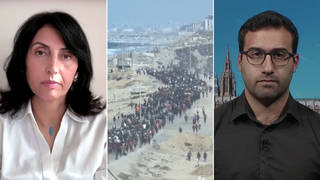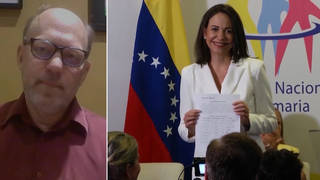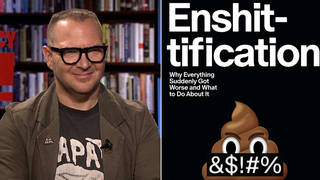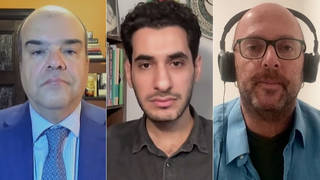
The Norwegian Nobel Committee has awarded the 2025 Nobel Peace Prize to María Corina Machado, a leading Venezuelan opposition figure. Machado was set to run for president last year, but she was disqualified by the government of President Nicolás Maduro, with fellow opposition leader Edmundo González standing in for her. Venezuela’s National Electoral Council ultimately declared Maduro the winner of the contested election, and he was sworn in for his third term in January.
Machado has voiced support for U.S. sanctions against Venezuela and other efforts to topple the government; she aims to privatize the country’s state oil industry and has praised right-wing Latin American leaders, including Argentina’s Javier Milei and El Salvador’s Nayib Bukele.
Friday’s Nobel announcement comes as U.S. President Donald Trump has openly campaigned for the award.
“It’s a perplexing choice,” says Greg Grandin, a historian of Latin America. “They’ve given it to somebody who’s completely aligned with the most militarist and darkest face of U.S. imperialism.”
Transcript
AMY GOODMAN: This is Democracy Now!, democracynow.org. I’m Amy Goodman.
The Norwegian Nobel Committee announced today the recipient of the 2025 Nobel Peace Prize.
JØRGEN WATNE FRYDNES: The Nobel Peace Prize for 2025 goes to a brave and committed champion of peace, to a woman who keeps the flame of democracy burning amidst a growing darkness. The Norwegian Nobel Committee has decided to award the Nobel Peace Prize for 2025 to María Corina Machado. She is receiving the Nobel Peace Prize for her tireless work promoting democratic rights for the people of Venezuela and for her struggle to achieve a just and peaceful transition from dictatorship to democracy. …
María Corina Machado meets all the three criteria stated in Alfred Nobel’s will for the selection of a peace prize. She has brought her country’s opposition together. She has never wavered in resisting the militarization of Venezuelan society. She has been steadfast in her support for a peaceful transition to democracy.
AMY GOODMAN: María Corina Machado is a longtime U.S. ally, nominated for the Nobel Peace Prize last year by a number of Florida Republicans, including then-Senator Marco Rubio, who’s now President Trump’s secretary of state. In 2002, Machado supported the coup that briefly overthrew Venezuela’s democratically elected President Hugo Chávez.
Machado attempted to run for president against incumbent Nicolás Maduro in the 2024 race, but was barred from running after the government accused her of corruption and cited her support for U.S. sanctions against Venezuela. Edmundo González ran in her place. Venezuela’s National Electoral Council declared Maduro the winner, but the opposition claimed González won.
Machado has vowed to privatize Venezuela’s state oil industry. She has also praised right-wing Latin American leaders, including Argentina’s Javier Milei.
The Nobel Committee’s selection of Machado comes at a time of heightened tension between the U.S. and Venezuela, as the U.S. continually bombs boats off the coast of Venezuela while threatening to launch a larger military operation. On Thursday, the Venezuelan government requested an emergency session of the U.N. Security Council to discuss the U.S. military actions.
For more, we go to Greg Grandin, Yale University history professor, Pulitzer Prize-winning author, whose latest book is America, América: A New History of the New World.
Professor Grandin, welcome back to Democracy Now! Your response to this Nobel Prize announcement?
GREG GRANDIN: Well, thanks for having me, Amy.
It’s a — it’s a perplexing choice on a number of levels and, it seems, inevitably will bring about the opposite of peace. You know, Machado is not a unifier, as the committee said. She represents the most intransigent face of the opposition, and not just — as you mentioned in your introduction, not just against Maduro, but against, you know, a democratically elected Hugo Chávez. She was a supporter of the 2002 coup. She has constantly divided the opposition and handicapped the opposition, frankly, when the opposition was trying to come up with a more moderate position that could challenge the social — the socialism of — 21st-century socialism that Chávez represented. She constantly represented a more hard line in terms of economics, in terms of U.S. relations, you know, and that intransigence has led her to rely on outside powers, notably the United States.
So, I mean, they didn’t give it to Donald Trump, but they seem to have given it to the next best thing in terms of — at least as long as Marco Rubio is concerned, if he needs justification to escalate military operations against Venezuela. It really seems to be a disastrous choice and a smear on the — I mean, your next guest is Cory Doctorow. It’s really the enshittification of the Nobel Peace Prize. I mean, they gave it to Kissinger in the 1970s, but at least he — they waited 'til he negotiated an end to the Vietnam War. I mean, I think of Rigoberta Menchú, who won it in the early 1980s, and, you know, her whole family was wiped out by U.S.-supported militarists and death squads in Guatemala. And now they've given it to somebody who’s completely aligned with the most militarist and darkest face of U.S. imperialism. It’s really a shocking choice.
AMY GOODMAN: And very quickly, again, this coming as the U.S. bombs one Venezuelan boat after another. The Colombian president, Petro, said in one of the bombings, a Colombian was killed. But an interesting piece in The New York Times, President Trump calling off efforts to reach a diplomatic agreement with Venezuela, paving the way for potential military escalation. Richard Grenell, the special presidential envoy, interim executive director of the Kennedy Center, had been leading the negotiations with Maduro. He has been instructed to cut off all diplomatic outreach. So, as we wrap up, if you can talk about what is happening —
GREG GRANDIN: Yeah.
AMY GOODMAN: — right now and the rage President Trump, interestingly, will feel at not getting the Nobel Peace Prize himself, as he has very explicitly demanded, and escalating what’s going on in Venezuela?
GREG GRANDIN: Yeah, it’s just going to harden positions all around. And Machado has not denounced, she’s actually endorsed the general framework for the — that legitimates the bombing of these go-fast boats in the Caribbean, four of them now, last one filled, apparently, with Colombians. She hasn’t denounced it. She’s supported it. She supports the idea, the framework, that the government is basically a cartel, and to blow up these boats is not to kill Venezuelans, but to kill, as she puts it, narcotraficantes.
I mean, it’s really — you know, there are plenty of feminist activists that oppose Maduro in Venezuela that would have legitimated the peace prize, that would have legitimated the opposition. There’s Isabel Mejias, who’s a feminist. She’s the head of Araña Feminista, the Feminist Spider. There’s Ana Rosa Torres, who considers herself a socialist, and she opposes the opposition and U.S. policy. That would have — that would have made sense, if the committee felt that, you know, it was time for Maduro to go.
But this really just actually strengthens Maduro, because, you know, it confirms his narrative about the opposition being in league with the Trump administration. So, you can just imagine that this is going to, as I said, bring about the opposite of peace. It’s going to — it’s laying the groundwork and justifying greater military escalation. It’s really a disaster. It’s really, really hard to understand how they came to this decision.
AMY GOODMAN: Greg Grandin, I want to thank you very much for being with us, Yale University history professor, Pulitzer Prize-winning author. His latest book, America, América: A New History of the New World.
Next up, we speak with the acclaimed writer Cory Doctorow, author of a new book, En — what should we say? — _En[bleep]ification: Why Everything Suddenly Got Worse and What to Do About It_. Stay with us.
[break]
AMY GOODMAN: “Peaceable Kingdom” by Patti Smith, performing at our Democracy Now! 20th anniversary. Next year we celebrate our 30th.











Media Options